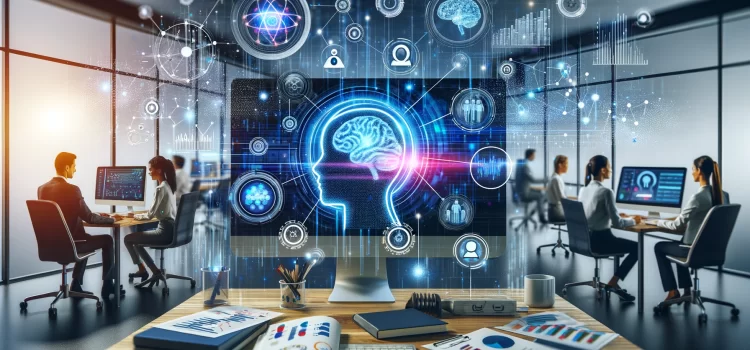The Role of AI in Digital Marketing: Trends & Tools for 2024

Introduction to AI in Digital Marketing
In today’s fast-evolving digital landscape, Artificial Intelligence (AI) is transforming how brands interact with their audiences. AI’s capabilities enable businesses to leverage vast amounts of data to deliver personalized experiences, streamline marketing efforts, and drive significant ROI. As we delve into the role of AI in digital marketing, we uncover the essential tools and strategies that position AI as an invaluable asset in 2024.
Enhancing Customer Experience with AI
AI significantly impacts digital marketing by customizing the customer journey. By analyzing data like purchase history and browsing habits, AI predicts user preferences, enhancing the AI marketing funnel. For instance, AI-driven chatbots provide round-the-clock support, enriching customer interaction and satisfaction. Such applications underscore the role of AI in digital marketing, transforming passive interactions into active engagement channels that drive loyalty and sales.
AI’s Revolutionary Tools in 2024
In 2024, a suite of sophisticated AI tools for digital marketing is set to revolutionize the industry. AI-powered chatbots, predictive analytics, and content generation tools are at the forefront, offering businesses innovative ways to engage customers. These tools are designed not only to enhance operational efficiency but also to provide deeper insights into consumer behavior, enabling marketers to craft strategies that are both proactive and reactive to market dynamics.
AI and SEO: A Symbiotic Relationship
AI’s influence extends significantly to Search Engine Optimization (SEO), where it helps in understanding and aligning with search engine algorithms more effectively. AI tools provide advanced keyword insights and trend forecasts, allowing marketers to optimize their content in real-time and maintain a competitive edge in search rankings. This integration of AI and the market demands is pivotal for staying relevant in an increasingly algorithm-driven world.
Case Studies: AI’s Impact on Real-World Marketing
Success stories from leading brands like Starbucks and Under Armour illustrate AI’s transformative power in marketing. Starbucks, through its Deep Brew program, utilizes AI to offer personalized customer interactions, increasing engagement and sales. Under Armour’s use of IBM’s Watson to power its Record app shows how AI can enhance user engagement through customized health and fitness advice. These examples not only highlight the effectiveness of AI in real-world applications but also its potential to drive innovation in marketing strategies.
The Future of AI in Digital Marketing
Looking ahead, the integration of AI with emerging technologies like Augmented Reality (AR) and Virtual Reality (VR) promises to create unprecedented marketing experiences. These technologies will allow for more personalized and immersive interactions, enhancing customer engagement and conversion rates. Moreover, AI’s role in automating mundane tasks will free up marketers to focus on more strategic and creative endeavors, thereby enhancing productivity and innovation.
Conclusion
The advent of AI in digital marketing has ushered in a new era of marketing intelligence. AI’s ability to swiftly analyze data and adapt to market trends has made it indispensable for modern marketing strategies. Its integration into digital marketing tools and technologies is not merely enhancing existing processes but is setting the stage for future advancements. Businesses that embrace this shift will find themselves well-equipped to navigate the complexities of the digital marketplace.
As we continue to witness the evolution of AI in marketing, it’s clear that its influence is foundational to the future of digital engagement. For businesses ready to leverage the full potential of AI, the opportunities are boundless. Ready to transform your marketing strategy with AI? Contact us today and discover how our cutting-edge solutions can propel your business forward.
Frequently Asked Questions
What Are Some Examples of AI in Digital Marketing?
AI is utilized in various ways in digital marketing, including personalized product recommendations on e-commerce sites, AI-driven content creation, and customer service chatbots that enhance user interaction and engagement.
What Is Artificial Intelligence in Digital Marketing?
Artificial Intelligence in digital marketing refers to the use of machine learning algorithms and software to analyze data, predict user behavior, and automate marketing tasks. It enhances the efficiency and effectiveness of marketing strategies and personalizes the customer experience.
Will AI Replace Digital Marketing Jobs?
While AI automates many aspects of digital marketing, it is unlikely to replace creative and strategic roles entirely. Instead, AI complements human skills, enabling marketers to focus on more complex and creative tasks by handling repetitive and data-intensive activities.

